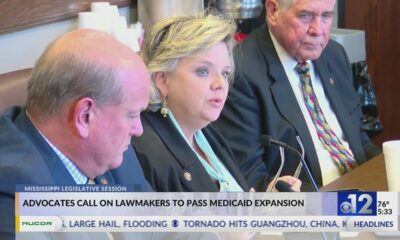Mississippi Today
Q&A: Rep. Missy McGee calls postpartum Medicaid expansion ‘most impactful thing’ state can do for women and children

Q&A: Rep. Missy McGee calls postpartum Medicaid expansion ‘most impactful thing' state can do for women and children
State Rep. Missy McGee, R-Hattiesburg, says it's her mission to advocate for women as one of few females in the Mississippi Legislature. Health Editor Kate Royals met with McGee to talk about her experiences as a lawmaker and her push to expand postpartum Medicaid coverage for new moms in Mississippi.
Editor's note: This interview has been edited for clarity and length.
Kate Royals: Tell me a bit about yourself – as a woman, a mom, a relatively new lawmaker.
Missy McGee: I was born and raised in Hattiesburg. I have a bachelor's and master's degree from Southern Miss. I spent a few years in Washington, D.C. after college and came back to Hattiesburg. I worked in my family business, I was an adjunct instructor at Southern Miss, so I've been in that university environment.
I'm married and I have two grown boys that are 24 and 21, and I sort of found myself here (as a legislator). You know, it's a strange path and I think probably all of us would say the same, but I never expected to run for public office. I was always a behind the scenes person on issues that were important to me or candidates who I felt like were the ones I thought we needed to support. So, I enjoyed being a behind the scenes person.
But it's really been a great privilege and honor to get to represent my hometown, a city that's been so good to me and my family. I was educated and raised in Hattiesburg. My children have been as well, so it's meaningful work to get to come to the Capitol and advocate for my district which is my home, my lifelong home. But hopefully to also move the needle for the state of Mississippi. It's been a great privilege and opportunity for me these past … this is my sixth session.
Royals: You introduced a bill in the House to extend postpartum Medicaid coverage for mothers in Mississippi from 2 months to 1 year. Why?
McGee: You know, I just felt like there has never been a more timely opportunity than this session, in this post-Dobbs era especially – but it's been important for longer than that to introduce a Medicaid postpartum bill that would extend coverage to 12 months.
As a woman and as a mother, I couldn't let this issue pass without advocating it and really trying to push it forward.
Royals: How do you think it would benefit the women in your area and also women across the state of Mississippi?(Editor's note: This interview was conducted before McGee's bill, House Bill 426, died without being considered in committee.)
McGee: I think it is the most impactful thing that we can do for women, moms and babies. So we know that … 36,000 babies were born in Mississippi in 2019, and we know that 65% of the babies born in Mississippi are born to moms on Medicaid. That's not hard math to figure out; that's 23,000 women a year. That's 23,000 women that this can impact, which is 23,000 babies, which is 23,000 families.
I really think that it is a pro-family position, certainly a pro-life position, to take care of these moms who are carrying and delivering and bringing these babies into the world – because healthy moms equal healthy babies. They go hand in hand, so I really believe it's currently the most impactful thing we can do for women and children.
Royals: You've got a hospital and a big health care community in your area – and they are in support of this?
McGee: Absolutely, they are. And it's not just the pediatricians and neonatologists who take care of these preemies in the NICU (who support extending postpartum coverage). But the ER docs are for it because … if a woman does not have health insurance and she's sick for whatever reason after having a child, she shows up in the emergency room. So ER doctors are supportive as well because they're seeing them, too.
I think it's safe to say the entire health care community knows this is important for the well being of moms and, again, babies.
Royals: It looks like Alabama and North Dakota were just approved by CMS for 12 months postpartum Medicaid coverage, joining half the states with approvals so far. Mississippi is at present 1 of only 2 states without extended PP coverage or Medicaid expansion. As someone very much in the middle of the lawmaking process, do you have any insight into why this may be?
McGee: All I would say is that I hope that we won't be going forward. I hope we will join those states in extending coverage to these moms to 12 months. That's all I can say on that.
Royals: According to the Center for American Women and Politics, you are one of 26 women in the entire state Legislature —26 out of 174. Can you tell me what that's like?
McGee: Yes, I believe I am one of 15 women in the House. So out of 122 members of the House of Representatives – and that number has changed a little bit. Well, you know, I feel like I have a greater responsibility to the women of Mississippi. We make up 50%, 51% of the state yet there are only 15 of 122 women in the House, so I do feel a greater responsibility to look out for the issues of women.
That's not my only concern, certainly, but I do feel an added responsibility to the women of Mississippi. Everybody comes to this job coming from their own frame of reference. As a woman, as a mom, I have experiences that my male colleagues don't have, just like they have experiences I don't. So on issues like this I feel like, not to be repetitive, I feel a higher responsibility to champion important causes for the well being of women in our state.
This article first appeared on Mississippi Today and is republished here under a Creative Commons license.
Did you miss our previous article…
https://www.biloxinewsevents.com/?p=207411
Mississippi Today
On this day in 1951


April 28, 1951

Ruby Hurley opened the first permanent office of the NAACP in the South.
Her introduction to civil rights activism began when she helped organize Marian Anderson's 1939 concert at the Lincoln Memorial. Four years later, she became national youth secretary for the NAACP. In 1951, she opened the organization's office in Birmingham to grow memberships in Alabama, Florida, Georgia, Mississippi and Tennessee.
When she arrived in Mississippi, there were only 800 NAACP members. After the governor made remarks she disagreed with, she wrote a letter to the editor that was published in a Mississippi newspaper. After that step in courage, membership grew to 4,000.
“They were surprised and glad to find someone to challenge the governor,” she told the Chicago Defender. “No Negro had ever challenged the governor before.”
She helped Medgar Evers investigate the 1955 murder of Emmett Till and other violence against Black Americans. Despite threats, she pushed on.
“When you're in the middle of these situations, there's no room for fear,” she said. “If you have fear in your heart or mind, you can't do a good job.”
After an all-white jury acquitted Till's killers, she appeared on the front cover of Jet magazine with the headline, “Most Militant Negro Woman in the South.”
Months later, she helped Autherine Lucy become the first Black student at the University of Alabama.
For her work, she received many threats, including a bombing attempt on her home. She opened an NAACP office in Atlanta, where she served as a mentor for civil rights leader Vernon Jordan, with whom she worked extensively and who went on to serve as an adviser to President Bill Clinton.
After learning of Evers' assassination in 1963, she became overwhelmed with sorrow. “I cried for three hours,” she said. “I shall always remember that pool of blood in which he lay and that spattered blood over the car where he tried to drag himself into the house.”
She died two years after retiring from the NAACP in 1978, and the U.S. Post Office recognized her work in the Civil Rights Pioneers stamp series. In 2022, she was portrayed in the ABC miniseries, “Women of the Movement.”
This article first appeared on Mississippi Today and is republished here under a Creative Commons license.
Mississippi Today
Rare open negotiations occur on important Medicaid expansion issue
The curtain was pulled back last week for the first time in years on the Mississippi Legislature's often mysterious conferencing process.
A conference committee consists of three representatives and three senators appointed to try to reach agreement when the two chambers pass differing versions of the same bill. Last week, a conference committee formed to try to reach agreement on Medicaid expansion caused a stir by meeting in a public setting.
Even though the joint rules of the Mississippi Legislature call for an open conferencing process, the conferees seldom meet in public. They usually meet and negotiate their differences near the end of the session behind closed doors.
That was not always the case.
For a period in the late 1990s and early 2000s, the Legislature, under intense pressure from the Mississippi Press Association, made open conference committees the norm.
Some major issues have been played out in public conference committees. Notable open conferences include:
- The infamous, excruciatingly long special session in 2002 where businesses received more protection from lawsuits.
- Budget fights when Haley Barbour was governor when legislators often would reach an impasse in the negotiations process and spend the bulk of their time talking about their cars and eating candy.
- The major rewrite of the state's economic development package under then-Gov. Ronnie Musgrove called Advantage Mississippi.
- The Mississippi Adequate Education Program, which for decades has provided the state's share for the basic operation of local school districts. It was hammered out in an open conference process in 1997 even before the joint rules mandated the open process.
Then-state Sen. Musgrove and former House Speaker Billy McCoy deserve credit or blame, according to one's perspective, for proving the open conference process could work. When they chaired their respective chamber's education committees, they insisted on having an open conference process.
But in more recent years, open conference committees have been few and far between. The joint rule has been largely ignored.
The fact that the three House and three Senate conferees agreed to meet at least once in public on Medicaid expansion — one of the most pivotal issues facing the Legislature in recent years — drew considerable attention.
If nothing else, the open conference committee provided a raw and unedited view of how far apart the two chambers were at the time on an issue that would provide additional health care coverage to primarily the working poor.
The House wanted to provide coverage to those earning up to 138% of the federal poverty level, or about $20,000 annually for an individual, while the Senate had proposed providing coverage to those earning less than 100% of the federal poverty level, or about $15,000 per year.
According to various experts, the House plan would provide coverage to many more working Mississippians and cost less to the state than would the Senate plan. The reason for the lower cost to the state is that when expanding to 138%, the federal government will pay 90% of the costs and provide the state an additional roughly $700 million over two years as an enticement to expand.
Under the Senate plan, the federal government will pay 77% of the cost and offer no incentives. It is important to understand that in the expensive world of health care, the difference in 77% of the cost and 90% means tens of millions to Mississippi state coffers.
The House conferees repeatedly pointed out those numbers — their plan covering more at less cost — during last week's open conference committee.
One of the reasons legislators through the years have not been enamored with an open conference process is that it has often turned into efforts by the negotiators to sell their position to the public.
Once the open conference process starts, the side that feels the most comfortable with its position wants to meet more often in full view of the public to make sure the public understands where each side stands.
For whatever it is worth, the House conferees were more enthusiastic about continuing the open process after the initial Medicaid expansion conference committee.
And after that initial open conference, the Senate offered a compromise to cover those earning up to 138% of the federal poverty level — just as the House proposed.
This article first appeared on Mississippi Today and is republished here under a Creative Commons license.
Mississippi Today
Legislation to strip key power of PERS Board passes both chambers
Legislation that strips significant power from the board that governs the state's public employee pension program has passed both chambers of the Legislature.
Under the legislation set to go to Gov. Tate Reeves during the final days of the 2024 session, the Public Employees Retirement System Board would no longer have the authority to increase the contribution rate levied on governments (both on the state and local level) to help pay for the massive retirement system.
The legislation, which passed both chambers in recent days, was a reaction to the decision by the board to increase by 5% over a three-year period the amount local governments contribute to each employee's paycheck for their retirement. Under the PERS Board plan, the employer contribution rate would have been increased to 22.4% over three years, starting with a 2% increase on July 1.
The board said the increase was needed to ensure the long-term financial stability of the system that pays retirement benefits for most public employees on the state and local levels, including staff of local school districts and universities and community colleges.
City and county government officials in particular argued that the 5% increase would force them to cut government services and lay off employees.
Under the bill passed by the Legislature there still would be a 2.5% increase over five years — a .5% increase in the employer contribution rate each year for five years.
In addition, legislative leaders said they plan to put another $100 million or more in state tax dollars into the retirement system in the coming days during the appropriations process.
Under current law, the PERS Board can act unilaterally to increase the amount of money governmental entities must contribute to the system. But under the new bill that passed both chambers, the board can only make a recommendation to the Legislature on increasing the employer contribution rate.
The PERS Board also would be required to include an analysis by its actuary and independent actuaries on the reason the increase was needed and the impact the increase would have on governmental entities.
In the 52-member Senate, 14 Democrats voted against the bill. Only one House member voted against the proposal.
Sen. David Blount, D-Jackson, said the bill failed to address the financial issues facing the system. He said a permanent funding stream is needed.
Blount said, “You are moving in the wrong direction and weakening the system” with the bill the Legislature approved. “Is it painful? Is it going to cost more money? Yes, but we need to do it” to fix the system.
The system has assets of about $32 billion, but debt of about $25 billion. But Sen. Daniel Sparks, R-Belmont, and others argued that the debt was “a snapshot” that could be reduced by strong performance from the stock market. The system depends on its investments and contributions from employers and employees as sources of revenue.
The system has about 360,000 members including current public employees and former employees and retirees.
The legislation states that no changes would be made for current members of the system. The legislation does reference looking at possibly changing the system for new employees. But that would be debated in future legislative sessions.
The bill does not include an earlier House proposal to dissolve the PERS Board, which consists primarily of people elected by the members of the system, and replace them with political appointees.
This article first appeared on Mississippi Today and is republished here under a Creative Commons license.
-
Local News3 days ago
Sister of Mississippi man who died after police pulled him from car rejects lawsuit settlement
-
Mississippi Today3 days ago
At Lake High School in Scott County, the Un-Team will never be forgotten
-
Mississippi News2 days ago
One injured in Mississippi officer-involved shooting after chase
-
Mississippi Today13 hours ago
On this day in 1951
-
Mississippi News6 days ago
Cicadas expected to takeover north Mississippi counties soon
-
Mississippi News5 days ago
Viewers make allegations against Hatley teacher, school district releases statement – Home – WCBI TV
-
Mississippi News Video4 days ago
Vehicle struck and killed man lying in the road, Alcorn County sheriff says
-
Mississippi Today7 days ago
On this day in 1892



































